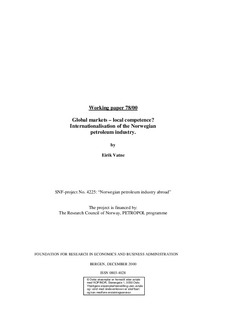| dc.description.abstract | The first part of this paper summarise the regime of regulation of the Norwegian petroleum activities historically, describe the fairly successful results of this seed bed policy, and lastly the need to internationalise the activity after a long period of developing capacities and capabilities. The main focus in this working paper is to use data from a descriptive study in models explaining internationalisation or a blocking of international activity in the offshore service and construction industry. Due to the quality of the data this analysis has to be looked on as experimental. The analysis gave as a result that it was mainly the specific market segment in this industry and the strategic behaviour of the firm that predicted a high rate of foreign sales. The exporting firms were groups into four types according to their strategic behaviour: proactive international, reactive international, dependent follower and flexible customiser, The first and third group of firms seem to succeed in international markets, the second and fourth not. We did not find any track of influence from size or R&D intensity in the firms’ ability to sell international. Explaining success in the Norwegian market on the other hand seems to be related to specialisation and R&D intensity. | en |
